AI
-
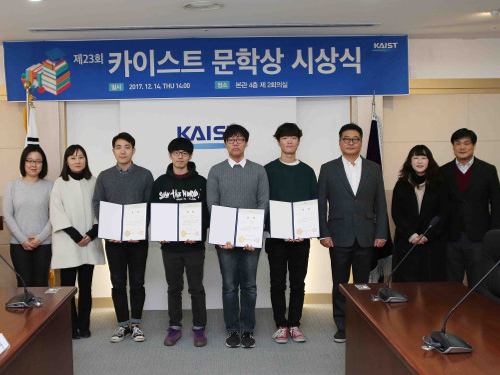 A Glance at the 2017 KAIST Literary Awards Ceremony
Since KAIST is a university specializing in science and engineering, people may think that the students rarely engage in literary activities. But KAIST students also excel in writing literature.
The 23rd KAIST Literary Award Ceremony was held on December 14 on the KAIST main campus. The award was established in 1995 to encourage students’ creative activities and to promote literary attainment. It is open to all KAIST students from undergraduate to masters and PhD students. This year, 43 students submitted a total of 68 literary works in the genres of poetry, novel, critique, and scenario.
KAIST professors Dong Ju Kim, Bong Gwan Jun, and Yunjeong Jo from the School of Humanities & Social Sciences participated as judges for the awards and they were joined by writers from the 8th Endless Road Program who served as invited judges for the novels and scenarios.
The Endless Road Program is a KAIST project for supporting artists who are engaged in literary works including scenarios, novels, webtoons, and movies by providing residences and funds. Novelists Jin Young Choi and Hak Chan Kim participated as judges for the novels and a drama scriptwriter, Joo Kim, as a judge of the scenarios.
After thorough evaluation, four submissions were chosen as awardees.
Section
Award
Name
Poetry
Winner
Sung Gil Moon (PhD candidate from the College of Business)
Runner-up
Jong Ik Jeon (Undergraduate student)
Novel
Winner
Joo Hwan Kim
(Undergraduate from the Dept. of Chemical and Biomolecular Engineering)
Runner-up
-
Essay & Critique
Winner
-
Runner-up
Jung Joon Park
(PhD candidate from the Dept. of Bio and Brain Engineering)
Scenario
Winner
-
Runner-up
-
The literary works as well as a review of the awards will be published in the KAIST Times in 2018.
2017.12.15 View 9104
A Glance at the 2017 KAIST Literary Awards Ceremony
Since KAIST is a university specializing in science and engineering, people may think that the students rarely engage in literary activities. But KAIST students also excel in writing literature.
The 23rd KAIST Literary Award Ceremony was held on December 14 on the KAIST main campus. The award was established in 1995 to encourage students’ creative activities and to promote literary attainment. It is open to all KAIST students from undergraduate to masters and PhD students. This year, 43 students submitted a total of 68 literary works in the genres of poetry, novel, critique, and scenario.
KAIST professors Dong Ju Kim, Bong Gwan Jun, and Yunjeong Jo from the School of Humanities & Social Sciences participated as judges for the awards and they were joined by writers from the 8th Endless Road Program who served as invited judges for the novels and scenarios.
The Endless Road Program is a KAIST project for supporting artists who are engaged in literary works including scenarios, novels, webtoons, and movies by providing residences and funds. Novelists Jin Young Choi and Hak Chan Kim participated as judges for the novels and a drama scriptwriter, Joo Kim, as a judge of the scenarios.
After thorough evaluation, four submissions were chosen as awardees.
Section
Award
Name
Poetry
Winner
Sung Gil Moon (PhD candidate from the College of Business)
Runner-up
Jong Ik Jeon (Undergraduate student)
Novel
Winner
Joo Hwan Kim
(Undergraduate from the Dept. of Chemical and Biomolecular Engineering)
Runner-up
-
Essay & Critique
Winner
-
Runner-up
Jung Joon Park
(PhD candidate from the Dept. of Bio and Brain Engineering)
Scenario
Winner
-
Runner-up
-
The literary works as well as a review of the awards will be published in the KAIST Times in 2018.
2017.12.15 View 9104 -
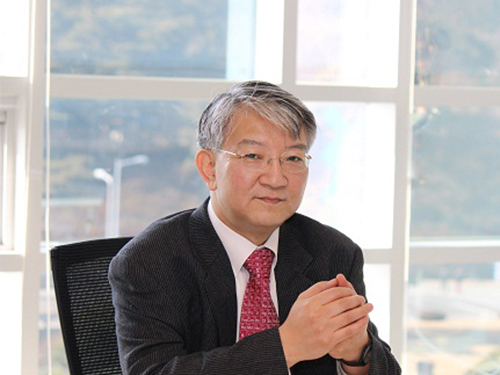 Distinguished Professor Sang Yup Lee Named NAI Fellow
(Distinguished Professor Sang Yup Lee)
Distinguished Professor Sang Yup Lee of the Department of Chemical and Biomolecular Engineering was named to the National Academy of Inventors in the US. He is the first Korean scholar ever elected as a NAI fellow.
The NAI is a non-profit member organization with over 4,000 individual inventors and fellows spanning more than 250 institutions worldwide. It is comprised of universities as well as governmental and non-profit research institutes. The academy was founded in 2010 to recognize and encourage inventors with patents from the US Patent and Trademark Office. So far, 575 fellows from 229 institutions have been elected.
The academy said Professor Lee has been recognized for fellowship induction as he has demonstrated a highly prolific spirit of innovation in creating or facilitating outstanding inventions that have made a tangible impact on quality of life, economic development, and the welfare of society.
Distinguished Professor Lee, a pioneering researcher and scholar in the field of systems metabolic engineering, was ranked in the top 1% of highly cited researchers (HCR) this year. Over the past 11 years, he published more than 130,000 articles in prestigious journals around the world. He has been cited more than 34,000 times since he started working at KAIST in 1994.
He is also the first Korean ever elected to both the National Academy of Sciences (NAS) and the National Academy of Engineering (NAE) in the US, becoming the one of 13 foreign scholars in the world holding two prestigious institutions’ fellowships.
Dr. Lee is currently the dean of KAIST Institutes, the world-leading institute for multi and interdisciplinary research. He is also serving as co-chair of the Global Council on Biotechnology and is a member of the Global Future Council on the Fourth Industrial Revolution at the World Economic Forum.
2017.12.13 View 10054
Distinguished Professor Sang Yup Lee Named NAI Fellow
(Distinguished Professor Sang Yup Lee)
Distinguished Professor Sang Yup Lee of the Department of Chemical and Biomolecular Engineering was named to the National Academy of Inventors in the US. He is the first Korean scholar ever elected as a NAI fellow.
The NAI is a non-profit member organization with over 4,000 individual inventors and fellows spanning more than 250 institutions worldwide. It is comprised of universities as well as governmental and non-profit research institutes. The academy was founded in 2010 to recognize and encourage inventors with patents from the US Patent and Trademark Office. So far, 575 fellows from 229 institutions have been elected.
The academy said Professor Lee has been recognized for fellowship induction as he has demonstrated a highly prolific spirit of innovation in creating or facilitating outstanding inventions that have made a tangible impact on quality of life, economic development, and the welfare of society.
Distinguished Professor Lee, a pioneering researcher and scholar in the field of systems metabolic engineering, was ranked in the top 1% of highly cited researchers (HCR) this year. Over the past 11 years, he published more than 130,000 articles in prestigious journals around the world. He has been cited more than 34,000 times since he started working at KAIST in 1994.
He is also the first Korean ever elected to both the National Academy of Sciences (NAS) and the National Academy of Engineering (NAE) in the US, becoming the one of 13 foreign scholars in the world holding two prestigious institutions’ fellowships.
Dr. Lee is currently the dean of KAIST Institutes, the world-leading institute for multi and interdisciplinary research. He is also serving as co-chair of the Global Council on Biotechnology and is a member of the Global Future Council on the Fourth Industrial Revolution at the World Economic Forum.
2017.12.13 View 10054 -
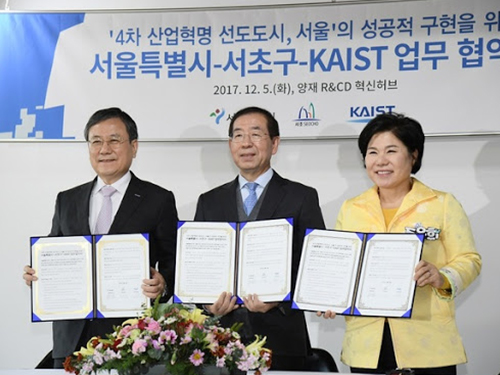 MoU by KAIST-Seoul-Seocho-gu for the 4th Industrial Revolution
The opening ceremony of the Yangjae R&CD Innovation Hub was held in Seoul on December 5. More than 400 guests came to the ceremony from major institutes and companies that are based in the hub. KAIST President Sung-Chul Shin, the Mayor of Seoul, Won-soon Park, and the Mayor of Seocho-gu, Eun Hee Cho, signed an MoU for Seoul to be the leading city for successfully realizing the Fourth Industrial Revolution.
The three organizations aim to cooperate with one another in various areas, including an economic boost for local job creation, technology development, and the promotion of projects through an industry-academia-institute network and fostering manpower.
Yangjae R&CD is the first facility specializing in and dedicated for Artificial Intelligence, which is the major topic of the Fourth Industrial Revolution.
The hub is comprised of enterprises specializing in AI, open co-work spaces, conference rooms, an open networking lounge, and spaces for fostering professional manpower. The hub will recruit additional enterprises and individuals who wish to move in. KAIST, an institute containing professors and researchers in the field of AI, and Modulabs, an organization becoming distinguished in AI research, will be in charge of operating the facility together.
The Yangjae R&CD Innovation Hub will operate a professional training program with participation from KAIST professors, which aims to produce 500 professionals in AI research and development by 2020. It will also provide inexpensive space as well as consultations and venture capital to startup and venture companies. It plans to find and foster 50 innovation companies by 2020.
In particular, the hub will operate a course for new AI business models 24 times over three years.
The hub also offers job consultations, academic conferences, public space for companies residing in the hub, a free GPU cluster server, technical training, seminars, forums, investment attraction, overseas expansion, and one-to-one technical consultations.
The Yangjae R&CD Zone is the place established for the Fourth Industrial Revolution by Seoul. R&CD is a concept combining Research and Development, Connection, Companies, Community, and Culture.
Seoul aims to create the Yangjae Zone as an urban innovation hub for facilitating industry-academia linkage as well as establishing a startup-settlement-growth technical ecosystem.
2017.12.11 View 11085
MoU by KAIST-Seoul-Seocho-gu for the 4th Industrial Revolution
The opening ceremony of the Yangjae R&CD Innovation Hub was held in Seoul on December 5. More than 400 guests came to the ceremony from major institutes and companies that are based in the hub. KAIST President Sung-Chul Shin, the Mayor of Seoul, Won-soon Park, and the Mayor of Seocho-gu, Eun Hee Cho, signed an MoU for Seoul to be the leading city for successfully realizing the Fourth Industrial Revolution.
The three organizations aim to cooperate with one another in various areas, including an economic boost for local job creation, technology development, and the promotion of projects through an industry-academia-institute network and fostering manpower.
Yangjae R&CD is the first facility specializing in and dedicated for Artificial Intelligence, which is the major topic of the Fourth Industrial Revolution.
The hub is comprised of enterprises specializing in AI, open co-work spaces, conference rooms, an open networking lounge, and spaces for fostering professional manpower. The hub will recruit additional enterprises and individuals who wish to move in. KAIST, an institute containing professors and researchers in the field of AI, and Modulabs, an organization becoming distinguished in AI research, will be in charge of operating the facility together.
The Yangjae R&CD Innovation Hub will operate a professional training program with participation from KAIST professors, which aims to produce 500 professionals in AI research and development by 2020. It will also provide inexpensive space as well as consultations and venture capital to startup and venture companies. It plans to find and foster 50 innovation companies by 2020.
In particular, the hub will operate a course for new AI business models 24 times over three years.
The hub also offers job consultations, academic conferences, public space for companies residing in the hub, a free GPU cluster server, technical training, seminars, forums, investment attraction, overseas expansion, and one-to-one technical consultations.
The Yangjae R&CD Zone is the place established for the Fourth Industrial Revolution by Seoul. R&CD is a concept combining Research and Development, Connection, Companies, Community, and Culture.
Seoul aims to create the Yangjae Zone as an urban innovation hub for facilitating industry-academia linkage as well as establishing a startup-settlement-growth technical ecosystem.
2017.12.11 View 11085 -
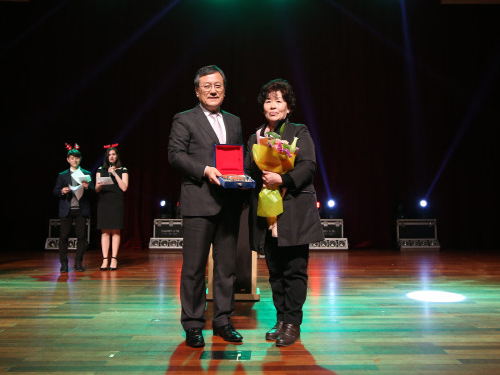 KAIST International Community Celebrates the Year-End
KAIST international community all gathered in celebration of the year-end on December 5 at the KAIST auditorium. This year, the community made the year-end party very special, expressing their appreciation very touching way at the event hosted by the International Scholar and Student Services (ISSS). Nearly 650 international faculty, students, and their family members joined the party.
Currently, 184 faculty members and researchers from 29 countries are working at KAIST, with 901 international students from 92 countries enrolled.
The two-hour party offered them a chance to enjoy a wide variety of activities and events, including dance performances, student performances, games, and dinner.
The party also had a meaningful award ceremony. Prior to the event, a month-long survey was conducted, asking international scholars and students which on-campus team they were most thankful for this year. Candidates for the appreciation award were: Safety and Security Team, Student Affairs Team, Campus Police, dormitory supervisors, and campus cleaning staff.
Approximately 470 scholars and students responded to the survey and 214 voted for the campus cleaning staff (45.5%).
(President Sung-Chul Shin and Myeongja Kim)
Ms. Myeongja Kim, a director of the cleaning staff in the undergraduate zone, received the award on behalf of the entire cleaning staff. At the ceremony, President Sung-Chul Shin conferred the award.
President Shin in his welcoming remarks said that globalization is his priority and urgent mission. To make KAIST more globalized, he said he will focus on three agendas; to make the campus KAIST a more welcoming environment for international community; to make campus more inclusive and diverse; to enhance the global visibility of KAIST more proactively. Click for the full text of opening remarks
2017.12.11 View 6704
KAIST International Community Celebrates the Year-End
KAIST international community all gathered in celebration of the year-end on December 5 at the KAIST auditorium. This year, the community made the year-end party very special, expressing their appreciation very touching way at the event hosted by the International Scholar and Student Services (ISSS). Nearly 650 international faculty, students, and their family members joined the party.
Currently, 184 faculty members and researchers from 29 countries are working at KAIST, with 901 international students from 92 countries enrolled.
The two-hour party offered them a chance to enjoy a wide variety of activities and events, including dance performances, student performances, games, and dinner.
The party also had a meaningful award ceremony. Prior to the event, a month-long survey was conducted, asking international scholars and students which on-campus team they were most thankful for this year. Candidates for the appreciation award were: Safety and Security Team, Student Affairs Team, Campus Police, dormitory supervisors, and campus cleaning staff.
Approximately 470 scholars and students responded to the survey and 214 voted for the campus cleaning staff (45.5%).
(President Sung-Chul Shin and Myeongja Kim)
Ms. Myeongja Kim, a director of the cleaning staff in the undergraduate zone, received the award on behalf of the entire cleaning staff. At the ceremony, President Sung-Chul Shin conferred the award.
President Shin in his welcoming remarks said that globalization is his priority and urgent mission. To make KAIST more globalized, he said he will focus on three agendas; to make the campus KAIST a more welcoming environment for international community; to make campus more inclusive and diverse; to enhance the global visibility of KAIST more proactively. Click for the full text of opening remarks
2017.12.11 View 6704 -
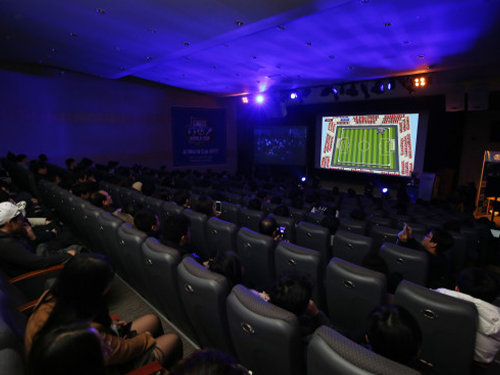 CBNU Wins the First AI World Cup 2017
KAIST hosted the first AI World Cup 2017. A total of 26 teams, comprised of Korean undergraduates or graduates, participated in AI Soccer, AI Commentator, and AI Reporter competitions.
On the first of December, the final tournament for AI Soccer was held in the KI Building. More than 200 people came to watch the first AI soccer match based on the Deep-Q Network Learning. The games were commentated by two KAIST students who humorously interpreted the games, catching people’s attention.
In AI Soccer, 18 teams participated, and KAIST BML (KAIST), AIM (KAIST), WISRL (KAIST), and AR Lab (Chonbuk National University) made it to the final four. Each team had its own unique style and strategy.
After some fierce contests, the win went to AR Lab, which showed fearless attacks throughout the game. Having no goalkeeper, AR Lab focused on attacking. According to the team, instead of training individual players, they concentrated on training a manager that directed the players, giving them a choice when to attack and defend.
(AR Lab from Chonbuk National University, the winning team of AI Soccer tournament)
Different from humans playing soccer, it was interesting to see how AI robots self-improved their movements while playing the games.
For AI Commentators, judges looked for a team with the most accuracy, forecasting ability, and fluency. Four teams competed, and the Yally team won the title.
For AI Reporters, which required informativeness and reliability, four teams participated, and the prize went to a team, named Deep CMT (KAIST).
Although this year’s games only included domestic universities, KAIST plans to extend participation to university students from around the world in the future, and hopes that the AI World Cup 2017 will become the foundation for launching the next games on an international level.
2017.12.04 View 6172
CBNU Wins the First AI World Cup 2017
KAIST hosted the first AI World Cup 2017. A total of 26 teams, comprised of Korean undergraduates or graduates, participated in AI Soccer, AI Commentator, and AI Reporter competitions.
On the first of December, the final tournament for AI Soccer was held in the KI Building. More than 200 people came to watch the first AI soccer match based on the Deep-Q Network Learning. The games were commentated by two KAIST students who humorously interpreted the games, catching people’s attention.
In AI Soccer, 18 teams participated, and KAIST BML (KAIST), AIM (KAIST), WISRL (KAIST), and AR Lab (Chonbuk National University) made it to the final four. Each team had its own unique style and strategy.
After some fierce contests, the win went to AR Lab, which showed fearless attacks throughout the game. Having no goalkeeper, AR Lab focused on attacking. According to the team, instead of training individual players, they concentrated on training a manager that directed the players, giving them a choice when to attack and defend.
(AR Lab from Chonbuk National University, the winning team of AI Soccer tournament)
Different from humans playing soccer, it was interesting to see how AI robots self-improved their movements while playing the games.
For AI Commentators, judges looked for a team with the most accuracy, forecasting ability, and fluency. Four teams competed, and the Yally team won the title.
For AI Reporters, which required informativeness and reliability, four teams participated, and the prize went to a team, named Deep CMT (KAIST).
Although this year’s games only included domestic universities, KAIST plans to extend participation to university students from around the world in the future, and hopes that the AI World Cup 2017 will become the foundation for launching the next games on an international level.
2017.12.04 View 6172 -
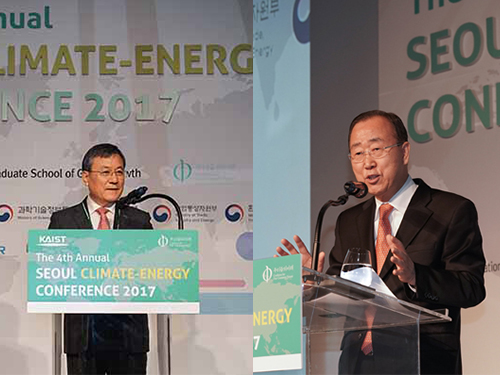 Seoul Climate-Energy Conference Seeks Global Sustainability
(President Shin and Former UN Secretary General at the Seoul Climate Change-Energy Conference)
Global leaders from both the private and public sectors discussed creative ways to seek inclusive green growth and sustainable development at the Seoul Climate-Energy Conference on November 24 in Seoul. The annual conference was co-hosted by KAIST and the Coalition for Our Common Future under the theme “Creating New Momentum for the Paris Agreement and a Sustainable Future.”
More than 100 global leaders participated in the forum including the Director General Frank Rijsbermanof the Global Green Growth Institute and Executive Director Howard Bamsey of the Green Climate Fund. Former UN Secretary-General Ban Ki-Moon, who played a significant role in the signing of the Paris Agreement, was the keynote speaker.
This year’s conference focused on Korea’s low carbon-energy transition and the Fourth Industrial Revolution to be aligned with green growth. At the conference, speakers and participants reviewed the progress of the decisions made by the UN Framework Convention on Climate Change (UNFCCC) COP23 in Bonn, Germany. The conference discussed topics of global collaboration for new climate regimes, green energy infrastructure, the Asia super grid, financing green energy, smart green cities, and new mobility.
President Sung-Chul Shin emphasized global action and greater resilience toward climate change in his opening remarks. He said, “Today’s climate change can be attributed directly to the past three industrial revolutions. As industrialization continues, we must not make future generations pay the cost of this Fourth Industrial Revolution.” He explained that it is increasingly complicated to address climate change and energy issues because even though the use of energy consumption will continue to increase, energy policies are interwoven with global politics.
He stressed three keywords to better address this global problem: innovation, collaboration, and speed. First he emphasized innovation as a priority for future success as it is hard to retain confidence without innovation.
He noted KAIST has made sustainability initiatives in the fields of EEWS (energy, environment, water, sustainability) and green mobility. He also noted the importance of collaboration as industries are moving beyond a single discipline. KAIST is making collaborations in R&D and sustainability sectors, such as Saudi Aramco’s CO2 management center in KAIST. Finally, he explained that the speed of new transformation will be beyond our imagination, and governments should work efficiently to address issues in a fast manner.
Meanwhile, Secretary-General Ban called for global unity in addressing climate change. He strongly emphasized that countries should make agreements not of willingness but of action, and that politicians should realize that this global agenda should be given top priority above domestic politics. He addressed how the world is experiencing the most powerful and destructive effects of climate change which makes active participation in the Paris Agreement increasingly important.
He expressed his concern that the richest and most powerful countries are backing off, emphasizing the role of these countries as both global leaders and top producers of CO2. He also shared his hopes that the OECD will continue to work to fill the absence of the United States, and stressed the importance of acquiring 10 billion USD by 2020 to fund mitigation and adaptation technologies for developing countries’ CO2 emissions.
Click for President Shin's opening remarks
2017.11.29 View 9894
Seoul Climate-Energy Conference Seeks Global Sustainability
(President Shin and Former UN Secretary General at the Seoul Climate Change-Energy Conference)
Global leaders from both the private and public sectors discussed creative ways to seek inclusive green growth and sustainable development at the Seoul Climate-Energy Conference on November 24 in Seoul. The annual conference was co-hosted by KAIST and the Coalition for Our Common Future under the theme “Creating New Momentum for the Paris Agreement and a Sustainable Future.”
More than 100 global leaders participated in the forum including the Director General Frank Rijsbermanof the Global Green Growth Institute and Executive Director Howard Bamsey of the Green Climate Fund. Former UN Secretary-General Ban Ki-Moon, who played a significant role in the signing of the Paris Agreement, was the keynote speaker.
This year’s conference focused on Korea’s low carbon-energy transition and the Fourth Industrial Revolution to be aligned with green growth. At the conference, speakers and participants reviewed the progress of the decisions made by the UN Framework Convention on Climate Change (UNFCCC) COP23 in Bonn, Germany. The conference discussed topics of global collaboration for new climate regimes, green energy infrastructure, the Asia super grid, financing green energy, smart green cities, and new mobility.
President Sung-Chul Shin emphasized global action and greater resilience toward climate change in his opening remarks. He said, “Today’s climate change can be attributed directly to the past three industrial revolutions. As industrialization continues, we must not make future generations pay the cost of this Fourth Industrial Revolution.” He explained that it is increasingly complicated to address climate change and energy issues because even though the use of energy consumption will continue to increase, energy policies are interwoven with global politics.
He stressed three keywords to better address this global problem: innovation, collaboration, and speed. First he emphasized innovation as a priority for future success as it is hard to retain confidence without innovation.
He noted KAIST has made sustainability initiatives in the fields of EEWS (energy, environment, water, sustainability) and green mobility. He also noted the importance of collaboration as industries are moving beyond a single discipline. KAIST is making collaborations in R&D and sustainability sectors, such as Saudi Aramco’s CO2 management center in KAIST. Finally, he explained that the speed of new transformation will be beyond our imagination, and governments should work efficiently to address issues in a fast manner.
Meanwhile, Secretary-General Ban called for global unity in addressing climate change. He strongly emphasized that countries should make agreements not of willingness but of action, and that politicians should realize that this global agenda should be given top priority above domestic politics. He addressed how the world is experiencing the most powerful and destructive effects of climate change which makes active participation in the Paris Agreement increasingly important.
He expressed his concern that the richest and most powerful countries are backing off, emphasizing the role of these countries as both global leaders and top producers of CO2. He also shared his hopes that the OECD will continue to work to fill the absence of the United States, and stressed the importance of acquiring 10 billion USD by 2020 to fund mitigation and adaptation technologies for developing countries’ CO2 emissions.
Click for President Shin's opening remarks
2017.11.29 View 9894 -
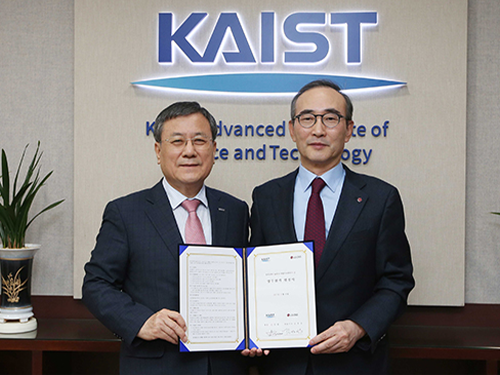 Strengthening Industry-Academia Cooperation with LG CNS
On November 20, KAIST signed an MoU with LG CNS for industry-academia partnership in education, research, and business in the fields of AI and Big Data. Rather than simply developing education programs or supporting industry-academia scholarships, both organizations agreed to carry out a joint research project on AI and Big Data that can be applied to practical business.
KAIST will collaborate with LG CNS in the fields of smart factories, customer analysis, and supply chain management analysis.
Not only will LG CNS offer internships to KAIST students, but it also will support professors and students who propose innovative startup ideas for AI and Big Data. Offering an industry-academia scholarship for graduate students is also being discussed. Together with LG CNS, KAIST will put its efforts into propose projects regarding AI and Big Data in the public sector.
Furthermore, KAIST and LG CNS will jointly explore and carry out industry-academia projects that could be practically used in business. Both will carry out the project vigorously through strong cooperation; for instance, LG CNS employees can be assigned to KAIST, if necessary. Also, LG CNS’s AI and Big Data platform, called DAP (Data Analytics & AI Platform) will be used as a data analysis tool during the project and the joint outcomes will be installed in DAP.
KAIST professors with expertise in AI deep learning have trained LG CNS employees since the Department of Industrial & Systems Engineering established ‘KAIST AI Academy’ in LG CNS last August.
“With KAIST, the best research-centered university in Korea, we will continue to lead in developing the field of AI and Big Data and provide innovative services that create value by connecting them to customer business,” Yong Shub Kim, the CEO of LG CNS, highlighted.
2017.11.22 View 13318
Strengthening Industry-Academia Cooperation with LG CNS
On November 20, KAIST signed an MoU with LG CNS for industry-academia partnership in education, research, and business in the fields of AI and Big Data. Rather than simply developing education programs or supporting industry-academia scholarships, both organizations agreed to carry out a joint research project on AI and Big Data that can be applied to practical business.
KAIST will collaborate with LG CNS in the fields of smart factories, customer analysis, and supply chain management analysis.
Not only will LG CNS offer internships to KAIST students, but it also will support professors and students who propose innovative startup ideas for AI and Big Data. Offering an industry-academia scholarship for graduate students is also being discussed. Together with LG CNS, KAIST will put its efforts into propose projects regarding AI and Big Data in the public sector.
Furthermore, KAIST and LG CNS will jointly explore and carry out industry-academia projects that could be practically used in business. Both will carry out the project vigorously through strong cooperation; for instance, LG CNS employees can be assigned to KAIST, if necessary. Also, LG CNS’s AI and Big Data platform, called DAP (Data Analytics & AI Platform) will be used as a data analysis tool during the project and the joint outcomes will be installed in DAP.
KAIST professors with expertise in AI deep learning have trained LG CNS employees since the Department of Industrial & Systems Engineering established ‘KAIST AI Academy’ in LG CNS last August.
“With KAIST, the best research-centered university in Korea, we will continue to lead in developing the field of AI and Big Data and provide innovative services that create value by connecting them to customer business,” Yong Shub Kim, the CEO of LG CNS, highlighted.
2017.11.22 View 13318 -
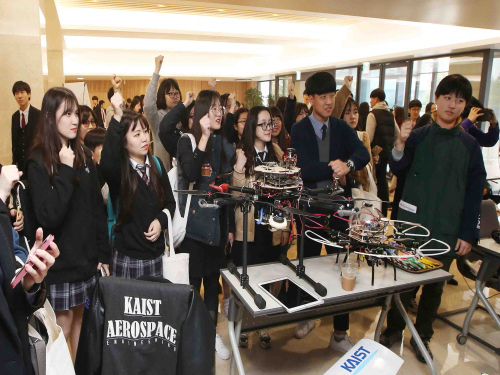 KAST Opened the Campus to the Public
KAIST hosted OPEN KAIST 2017 on the main campus from November 2 to 3, 2017. OPEN KAIST is a science and cultural event designed for students and the general public to experience and take a glance at research labs.
More than 10,000 visitors came to KAIST this year. Groups of families and students came to KAIST to experience various programs related to science.
Twenty departments, including Mechanical Engineering, Aerospace Engineering, the Graduate School of Cultural Technology, and Materials Science and Engineering participated in the event, along with three research centers and the Public Relations Office.
The event was composed of a total of 70 programs in four sections: lab tour, research performance exhibition, department introduction, and special lectures.
The kick off activity for the event was a trial game of the AI World Cup 2017 which will be hosted by KAIST in December 2017. Many people also visited the mobile health care showroom where they could experience what a future smart home and hospital would look like. It was also interesting to visit a futuristic living space for one-person households that provides virtual reality services.
KAIST hopes that the event offers an opportunity for children and students to get to know about science better. Professor Jong-Hwan Kim, the Dean of the College of Engineering at KAIST said, “OPEN KAIST is the one and only opportunity to visit and experience our research labs. KAIST will make every effort to take a step closer to the public by focusing on research that contributes to human society.”
2017.11.06 View 8211
KAST Opened the Campus to the Public
KAIST hosted OPEN KAIST 2017 on the main campus from November 2 to 3, 2017. OPEN KAIST is a science and cultural event designed for students and the general public to experience and take a glance at research labs.
More than 10,000 visitors came to KAIST this year. Groups of families and students came to KAIST to experience various programs related to science.
Twenty departments, including Mechanical Engineering, Aerospace Engineering, the Graduate School of Cultural Technology, and Materials Science and Engineering participated in the event, along with three research centers and the Public Relations Office.
The event was composed of a total of 70 programs in four sections: lab tour, research performance exhibition, department introduction, and special lectures.
The kick off activity for the event was a trial game of the AI World Cup 2017 which will be hosted by KAIST in December 2017. Many people also visited the mobile health care showroom where they could experience what a future smart home and hospital would look like. It was also interesting to visit a futuristic living space for one-person households that provides virtual reality services.
KAIST hopes that the event offers an opportunity for children and students to get to know about science better. Professor Jong-Hwan Kim, the Dean of the College of Engineering at KAIST said, “OPEN KAIST is the one and only opportunity to visit and experience our research labs. KAIST will make every effort to take a step closer to the public by focusing on research that contributes to human society.”
2017.11.06 View 8211 -
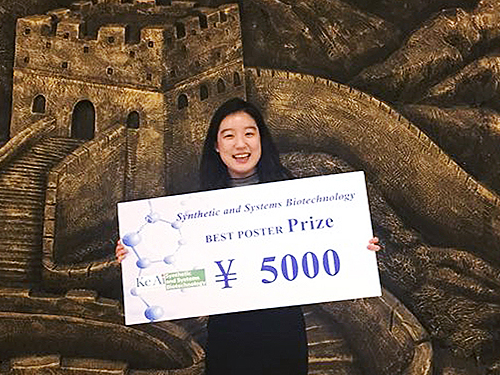 In Jin Cho Earned the Best Poster Prize at ME Summit 2017
In Jin Cho, a Ph.D. student in the Department of Chemical and Biomolecular Engineering at KAIST received the best poster prize at the International Metabolic Engineering Summit 2017 held on October 24 in Beijing, China.
The International Metabolic Engineering Summit is a global conference where scientists and corporate researchers in the field of metabolic engineering present their latest research outcomes and build networks.
At this year’s summit, about 500 researchers from around the world participated in active academic exchanges, including giving keynote speeches and presenting posters.
During the poster session, the summit selects one person for the KeAi-synthetic and Systems Biotechnology Poster Award, two for Microbial Cell Factories Poster Awards, and three for Biotechnology Journal Poster Awards among the posters presented by graduate students, post-doctoral fellows and researchers. Cho received the KeAi-synthetic and Systems Biotechnology Poster Award. Her winning poster is on the biotransformation of p-xylene to terephthalic acid using engineered Escherichia coli.
Terephthalic acid is generally produced by p-xylene oxidation; however, this process requires a high temperature and pressure as well as a toxic catalyst during the reaction process.
Cho and Ziwei Luo, a Ph.D. student at KAIST, co-conducted the research and developed a successful biological conversion process. Compared to the existing chemical process, it does not require a high temperature and pressure; and it is environmentally friendly with a relatively high conversion rate of approximately 97%.
Cho’s advisor, Distinguished Professor Sang Yup Lee said, “Further research on glucose-derived terephthalic acid will enable us to produce biomass-based eco-friendly terephthalic acid through engineered Escherichia coli.”
2017.10.31 View 11601
In Jin Cho Earned the Best Poster Prize at ME Summit 2017
In Jin Cho, a Ph.D. student in the Department of Chemical and Biomolecular Engineering at KAIST received the best poster prize at the International Metabolic Engineering Summit 2017 held on October 24 in Beijing, China.
The International Metabolic Engineering Summit is a global conference where scientists and corporate researchers in the field of metabolic engineering present their latest research outcomes and build networks.
At this year’s summit, about 500 researchers from around the world participated in active academic exchanges, including giving keynote speeches and presenting posters.
During the poster session, the summit selects one person for the KeAi-synthetic and Systems Biotechnology Poster Award, two for Microbial Cell Factories Poster Awards, and three for Biotechnology Journal Poster Awards among the posters presented by graduate students, post-doctoral fellows and researchers. Cho received the KeAi-synthetic and Systems Biotechnology Poster Award. Her winning poster is on the biotransformation of p-xylene to terephthalic acid using engineered Escherichia coli.
Terephthalic acid is generally produced by p-xylene oxidation; however, this process requires a high temperature and pressure as well as a toxic catalyst during the reaction process.
Cho and Ziwei Luo, a Ph.D. student at KAIST, co-conducted the research and developed a successful biological conversion process. Compared to the existing chemical process, it does not require a high temperature and pressure; and it is environmentally friendly with a relatively high conversion rate of approximately 97%.
Cho’s advisor, Distinguished Professor Sang Yup Lee said, “Further research on glucose-derived terephthalic acid will enable us to produce biomass-based eco-friendly terephthalic acid through engineered Escherichia coli.”
2017.10.31 View 11601 -
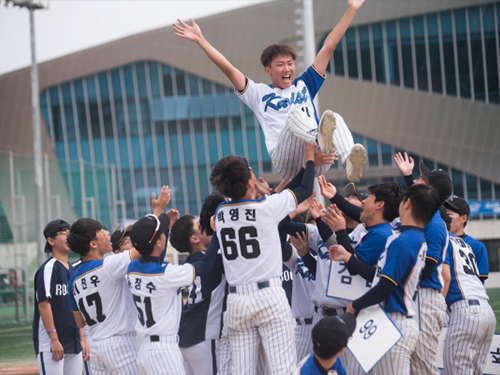 Postech-KAIST Rivalry Heats Up at the 16th Science War
The 16th Postech-KAIST Science War wrapped up its two-day rivals’ duel at the KAIST campus in Daejeon on September 23. The event was established in 2002 to build a close tie between the two renowned universities for science and technology, and to provide students with an opportunity to demonstrate their talents and abilities.
On September 21, a convoy of red Postech buses carrying more than 650 athletes, students, and supporters arrived at the KAIST campus in Daejeon. The two teams competed in eight events including both online and sports event.
The night before the actual games started, cheerleading teams from both Postech Cheero and KAIST ELKA kicked off the event.
1st Day (September 22)
The hacking tournament marked the beginning of the Science War. The event started at nine in the morning. Both teams had to solve four problems within 12 hours.
While the fierce hacking competition was underway, school music bands, including Twenties Dreams, opened up the event with beautiful voices.
The soccer game took place in the university stadium. The KAIST soccer team brought the first win to KAIST, and was their second straight victory in soccer.
At the outdoor theatre, the evening games, including Artificial Intelligence and E-sports (League of Legend) began. After the E-sports, both KAIST’s and Postech’s music and dance clubs showed amazing performances adding more excitement to the event.
Another fun aspect of the event was the ‘evening street food market’. Food trucks and food booths were lined up to satisfy students’ hunger. Talso here were various game booths such as can bowling, balloon darts, and lamp DIY.
2nd Day (September 23)
The baseball team marked the second day of the Science War in the Undergraduate Field. The KAIST team won the game by six runs.
Science quizzes sealed the Postech-KAIST Science War. Although the KAIST team led at the beginning, the Postech team overtook them by getting bonus point answers correct. This game decided Postech winning this year’s Science War.
As a spin-off, a badminton game was held in the Sports Complex and the KAIST team beat the Postech team with ease.
Last but not least, a basketball game was held in the Sports Complex. In the last game of the Science War, the KAIST team wiped away the stain of last year’s defeat.
At the closing ceremony, famous rappers and school music clubs celebrated the last moments of the Science War.
(Jiwon Hwang, Public Relations of the 16th Science War Committee)
(The 16th Science War Committee)
Cheers to the students committees, participants, and supporters who put every ounce of their effort into successfully running the 16th Postech-KAIST Science War.
Day
Category
Winner
Day 1
Hacking
Postech
Soccer
KAIST
Artificial Intelligence
Postech
E-Sports (LoL)
Postech
Day 2
Baseball
KAIST
Science Quizzes
Postech
Badminton (spin-off)
KAIST
Basketball
KAIST
(The final tally for KAIST in the Science Wars was eight wins and six losses)
2017.09.27 View 6835
Postech-KAIST Rivalry Heats Up at the 16th Science War
The 16th Postech-KAIST Science War wrapped up its two-day rivals’ duel at the KAIST campus in Daejeon on September 23. The event was established in 2002 to build a close tie between the two renowned universities for science and technology, and to provide students with an opportunity to demonstrate their talents and abilities.
On September 21, a convoy of red Postech buses carrying more than 650 athletes, students, and supporters arrived at the KAIST campus in Daejeon. The two teams competed in eight events including both online and sports event.
The night before the actual games started, cheerleading teams from both Postech Cheero and KAIST ELKA kicked off the event.
1st Day (September 22)
The hacking tournament marked the beginning of the Science War. The event started at nine in the morning. Both teams had to solve four problems within 12 hours.
While the fierce hacking competition was underway, school music bands, including Twenties Dreams, opened up the event with beautiful voices.
The soccer game took place in the university stadium. The KAIST soccer team brought the first win to KAIST, and was their second straight victory in soccer.
At the outdoor theatre, the evening games, including Artificial Intelligence and E-sports (League of Legend) began. After the E-sports, both KAIST’s and Postech’s music and dance clubs showed amazing performances adding more excitement to the event.
Another fun aspect of the event was the ‘evening street food market’. Food trucks and food booths were lined up to satisfy students’ hunger. Talso here were various game booths such as can bowling, balloon darts, and lamp DIY.
2nd Day (September 23)
The baseball team marked the second day of the Science War in the Undergraduate Field. The KAIST team won the game by six runs.
Science quizzes sealed the Postech-KAIST Science War. Although the KAIST team led at the beginning, the Postech team overtook them by getting bonus point answers correct. This game decided Postech winning this year’s Science War.
As a spin-off, a badminton game was held in the Sports Complex and the KAIST team beat the Postech team with ease.
Last but not least, a basketball game was held in the Sports Complex. In the last game of the Science War, the KAIST team wiped away the stain of last year’s defeat.
At the closing ceremony, famous rappers and school music clubs celebrated the last moments of the Science War.
(Jiwon Hwang, Public Relations of the 16th Science War Committee)
(The 16th Science War Committee)
Cheers to the students committees, participants, and supporters who put every ounce of their effort into successfully running the 16th Postech-KAIST Science War.
Day
Category
Winner
Day 1
Hacking
Postech
Soccer
KAIST
Artificial Intelligence
Postech
E-Sports (LoL)
Postech
Day 2
Baseball
KAIST
Science Quizzes
Postech
Badminton (spin-off)
KAIST
Basketball
KAIST
(The final tally for KAIST in the Science Wars was eight wins and six losses)
2017.09.27 View 6835 -
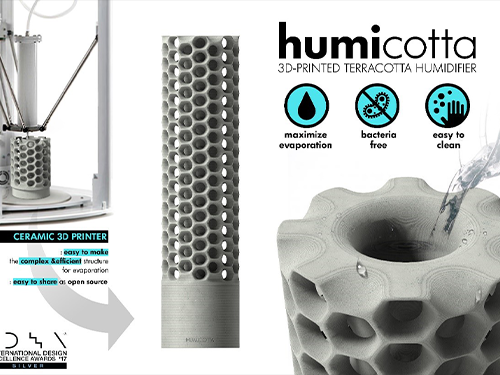 Humicotta Wins the Silver Prize at the 2017 IDEA
The 3D-printed ceramic humidifier made by the research team led by Professor Sang-Min Bae won the silver prize at the 2017 International Design Excellence Awards (IDEA). Professor Bae’s ID+IM team was also listed as winners of three more appropriate technology designs at the IDEA. The awards, sponsored by the Industrial Designers Society of America, are one of the three prestigious design awards including the Red Dot Design Award and the iF Design Award in Germany.
The silver prize winner in the category of home and bath, Humicotta is an energy-efficient, bacteria free, and easy to clean humidifier. It includes a base module and filter. The base is a cylindrical pedestal with a built-in fan on which the filter is placed. The filter is a 3D-printed honeycomb structure made of diatomite. When water is added, the honeycomb structure and porous terracotta maximize natural humidification. It also offers an open platform service that customizes the filters or provides files that users can use their own 3D printer.
Professor Bae’s team has worked on philanthropy design using appropriate technology as their main topic for years. Their designs have been recognized at prestigious global design awards events, winning more than 50 prizes with innovative designs made for addressing various global and social problems.
The Light Funnel is a novel type of lighting device designed for off-grid areas of Africa. It helps to maximize the natural light effect in the daytime without any drastic home renovations. It consists of a transparent acrylic sphere and a reflective pathway. After filling the acrylic sphere with water and placing it on a rooftop, sunlight passes into the house through the water inside the sphere. It provides a lighted environment nine times brighter than without it. Also, once installed, it can be used almost permanently.
The Maasai Smart Cane is made using wood sticks purchased through fair trade with the Maasai tribe. GPS is installed into the grip of the birch-tree cane, so that cane users can send a signal when in an emergency situation. All of the proceeds of this product go to the tribe.
S.Cone is a first aid kit made in collaboration with Samsung Fire and Marine Insurance. The traffic cone-shaped kit is designed to help users handle an emergency situation intact and safe. The S.Cone has unique versions for fires, car accidents, and marine accidents. For example, the S.Cone for fires is equipped with a small fire extinguisher, smoke mask, and fire blanket. The cap of the S.Cone also functions as an IoT station connecting the fire and gas detector with smart phones.
Professor Bae said of his team’s winning design products, “By making the data public, any person can design their own humidifier if they have access to a 3D-printer. We want it to be a very accessible product for the public. The Light Funnel and Maasai Smart Cane are designed for economically-marginalized populations and the elderly. We will continue to make the best designed products serving the marginalized 90% of the population around the world.”
2017.09.14 View 28882
Humicotta Wins the Silver Prize at the 2017 IDEA
The 3D-printed ceramic humidifier made by the research team led by Professor Sang-Min Bae won the silver prize at the 2017 International Design Excellence Awards (IDEA). Professor Bae’s ID+IM team was also listed as winners of three more appropriate technology designs at the IDEA. The awards, sponsored by the Industrial Designers Society of America, are one of the three prestigious design awards including the Red Dot Design Award and the iF Design Award in Germany.
The silver prize winner in the category of home and bath, Humicotta is an energy-efficient, bacteria free, and easy to clean humidifier. It includes a base module and filter. The base is a cylindrical pedestal with a built-in fan on which the filter is placed. The filter is a 3D-printed honeycomb structure made of diatomite. When water is added, the honeycomb structure and porous terracotta maximize natural humidification. It also offers an open platform service that customizes the filters or provides files that users can use their own 3D printer.
Professor Bae’s team has worked on philanthropy design using appropriate technology as their main topic for years. Their designs have been recognized at prestigious global design awards events, winning more than 50 prizes with innovative designs made for addressing various global and social problems.
The Light Funnel is a novel type of lighting device designed for off-grid areas of Africa. It helps to maximize the natural light effect in the daytime without any drastic home renovations. It consists of a transparent acrylic sphere and a reflective pathway. After filling the acrylic sphere with water and placing it on a rooftop, sunlight passes into the house through the water inside the sphere. It provides a lighted environment nine times brighter than without it. Also, once installed, it can be used almost permanently.
The Maasai Smart Cane is made using wood sticks purchased through fair trade with the Maasai tribe. GPS is installed into the grip of the birch-tree cane, so that cane users can send a signal when in an emergency situation. All of the proceeds of this product go to the tribe.
S.Cone is a first aid kit made in collaboration with Samsung Fire and Marine Insurance. The traffic cone-shaped kit is designed to help users handle an emergency situation intact and safe. The S.Cone has unique versions for fires, car accidents, and marine accidents. For example, the S.Cone for fires is equipped with a small fire extinguisher, smoke mask, and fire blanket. The cap of the S.Cone also functions as an IoT station connecting the fire and gas detector with smart phones.
Professor Bae said of his team’s winning design products, “By making the data public, any person can design their own humidifier if they have access to a 3D-printer. We want it to be a very accessible product for the public. The Light Funnel and Maasai Smart Cane are designed for economically-marginalized populations and the elderly. We will continue to make the best designed products serving the marginalized 90% of the population around the world.”
2017.09.14 View 28882 -
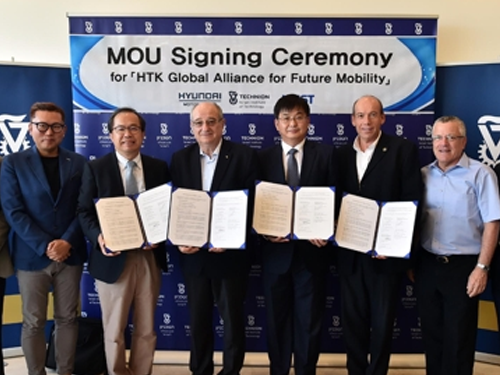 KAIST Partners with Technion and Hyundai Motors for Future Mobility Technology Development
(KAIST Associate Vice President of Research Joung-Ho Kim(third from left) poses with Technion President Pereta Lavie and CTO Tae Won Im of Hyundai Motors)
KAIST has partnered with the Israel Institute of Technology, Technion, and Hyundai Motors to take the lead in the field of future mobility technologies. The three parties signed a consortium of global alliance for future mobility partnership at Technion on Sept. 5. KAIST Associate Vice President of Research Kim Joung-Ho, Hyundai Motor’s Central Advanced Research and Engineering CTO Tae Won Lim, and Technion President Peretz Lavie signed the MOU.
The three parties agreed to conduct joint research on hi-tech mobility areas including self-driving systems, cyber security, and AI in mobility. With the signing of the consortium, KAIST's technology in AI, semiconductors, and autonomous cars will produce synergy with Technion’s connected car solutions, advancing Hyundai Motor's competitiveness in the future mobility market.
In addition to the consortium, the three parties will set-up a startup consulting committee, which will provide consulting services for nurturing venture startups with creative ideas and outstanding technological prowess in their host countries.
2017.09.07 View 7316
KAIST Partners with Technion and Hyundai Motors for Future Mobility Technology Development
(KAIST Associate Vice President of Research Joung-Ho Kim(third from left) poses with Technion President Pereta Lavie and CTO Tae Won Im of Hyundai Motors)
KAIST has partnered with the Israel Institute of Technology, Technion, and Hyundai Motors to take the lead in the field of future mobility technologies. The three parties signed a consortium of global alliance for future mobility partnership at Technion on Sept. 5. KAIST Associate Vice President of Research Kim Joung-Ho, Hyundai Motor’s Central Advanced Research and Engineering CTO Tae Won Lim, and Technion President Peretz Lavie signed the MOU.
The three parties agreed to conduct joint research on hi-tech mobility areas including self-driving systems, cyber security, and AI in mobility. With the signing of the consortium, KAIST's technology in AI, semiconductors, and autonomous cars will produce synergy with Technion’s connected car solutions, advancing Hyundai Motor's competitiveness in the future mobility market.
In addition to the consortium, the three parties will set-up a startup consulting committee, which will provide consulting services for nurturing venture startups with creative ideas and outstanding technological prowess in their host countries.
2017.09.07 View 7316